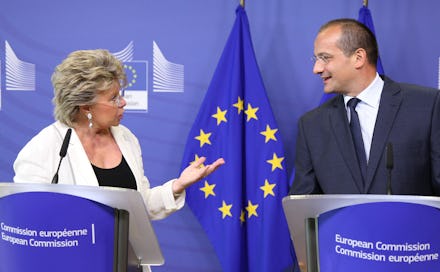Wowza: The EU Wants to Turn Itself Into a "United States Of Europe"

The news: A leading official with the European Union has called for a "United States of Europe." Uh, what?
Earlier this week, Viviane Reding, the European Commissioner for Justice, Fundamental Rights, and Citizenship, said that Europe "needs to build a United States of Europe with the Commission as government." She described the plan as a "true political union" and wants it put to a vote this spring.
The European Union will hold elections in May, when its 28 member countries will vote on the future of EU operations. There's a lot at stake. "In a little more than four months' time, citizens across Europe will be able to choose the Europe they want to live in," Reding said. For her, that means a unified Europe under one central government.
How would this work? Reding's plan for a "United States of Europe" would make the European Commission the central government, with the European Parliament and a "Senate of member states" serving as two branches. This would relegate individual national governments to secondary status. Basically, it'd work the same way the United States of America works. There'd be one central government ruling over a group of individual governments. It's federalism on a grand scale.
Does it have a chance? Probably not. Though Reding's plan seemingly has some support among some of the EU member nations, it has been met with considerable resistance from others, particularly Britain, which isn't that fond of the EU in general and is considering withdrawing. Nigel Farage, a political leader in Britain, said of Reding’s proposal: "I am sure the people will say no to this centralist fanaticism."
The plan and vote come at a time when Europe's a bit chaotic. Countries like Greece and Spain are in the throes of economic crises, while others like Germany remain stoic. The idea of a unified government seems far off.
Don't expect Europe to turn into the United States any time soon. Nations that have enjoyed autonomy until now aren't likely going to vote to give up self-governance. There are, of course, positive arguments for a centralized European government (proponents look to the first World War as warnings against individualized nationalism), but a new super state remains unlikely.